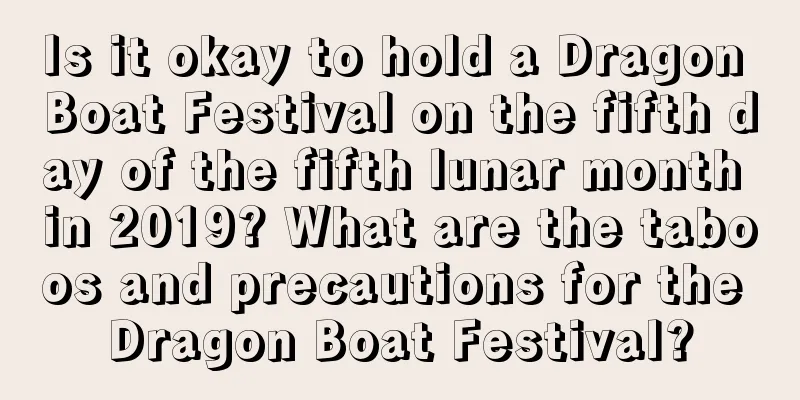What are the customs on New Year’s Eve? Detailed explanation of the custom of staying up all night on New Year's Eve

Introduction: We Chinese all know that New Year’s Eve is the last day of the lunar year. On this day, people in many places will stay up all night to “watch the year ahead”. Watching the year ahead is also one of the most distinctive customs of New Year’s Eve. Why do we stay up all night on New Year’s Eve? How did the custom of staying up all night to see the New Year come from? Please follow the editor to learn more about it below! New Year’s Eve is the most traditional and important festival of our Chinese nation. There are many folk customs and activities during New Year’s Eve. If you want to know more, please check out the New Year’s Eve special topic compiled by Mr. Shui Mo for you!The Origin of the Custom of Staying Up for the New YearThere is a legend: In ancient times there was a ferocious monster called Xi, which would come out to harm people at the end of every year. Later, people knew that Xi was most afraid of the color red and noise, so on New Year’s Eve, every household would put up red spring couplets and set off firecrackers to drive away the New Year’s Eve monster in order to pray for peace in the new year. This custom has been passed down since then, and the night of New Year's Eve is called New Year's Eve. All Chinese people in the world have the habit of staying up late on New Year's Eve. The New Year's Eve celebration begins with the New Year's Eve dinner, which should be eaten slowly, starting from the time when the lights are turned on. Some families will eat until late at night. In ancient times, staying up all night to celebrate the New Year had two meanings: for the elderly, it was to "bid farewell to the old year" and to cherish time; for the young, it was to extend their parents' lives. Since the Han Dynasty, the time when the old year turns to the new year is generally midnight. People all over the world are looking forward to the arrival of New Year's Eve. The custom of staying up all night to welcome the New Year expresses both a sense of farewell and a desire to remember the passing years, and a hope for the coming New Year. The ancients wrote in a poem "Keeping the New Year's Eve": "We invited each other to stay up together at Arong's house, and the candles passed red towards the green gauze. Thirty-six decades have passed in vain, but I cherish the years from now on." It is human nature to cherish the years, so the great poet Su Shi wrote the famous lines from "Keeping the New Year's Eve": "There will be no year next year, and I am afraid that I will waste time; I will work hard tonight, and I can still be proud of my youth!" This shows the positive significance of staying up on New Year's Eve.Staying up all night: "staying up all year"Staying up all night on New Year’s Eve is commonly known as “staying up all night”. Why is it called "Ao Nian"? According to legend, in the ancient times, there was a ferocious monster which people called "Nian". Every New Year’s Eve, the Nian beast would crawl out of the sea to harm humans and animals, destroy farmland, and bring disaster to people who had worked hard for a year. In order to avoid the Nian monster, people would close their doors early on the night of the 30th day of the twelfth lunar month before it got dark. They would not dare to sleep and would wait for dawn. They would drink to kill time and to give themselves courage. They would not dare to go out until the morning of the first day of the new year when the Nian beast no longer came out. When people met each other, they bowed and congratulated each other, feeling lucky that they had not been eaten by the Nian beast. Many years passed like this without any incidents, and people relaxed their vigilance against the Nian beast. On the night of New Year one year, the Nian beast suddenly rushed into a village in the south of the Yangtze River. Almost all the people in the village were eaten by the beast. Only a newly married couple who hung red curtains and wore red clothes were safe and sound. There were also a few children who were playing with a bunch of bamboos in the yard. The fire was red and the bamboos made crackling sounds when they burned. The Nian beast came over and was so scared by the fire that it turned around and fled. From then on, people knew that the Nian monster was afraid of red, light, and loud noises. So at the end of the year and the beginning of the next year, every household would paste red paper, wear red robes, hang red lanterns, beat gongs and drums, and set off firecrackers, so that the Nian monster would not dare to come again. In the "Book of Songs·Xiaoya·Ting Liao", there is a record of "the light of the court fire". The so-called "Ting Liao" is a torch made of bamboo poles. After the bamboo poles burn, the air in the bamboo joints expands, the bamboo cavity bursts, and makes crackling sounds. This is the origin of "firecrackers". But in some places, villagers did not know that the Nian beast was afraid of red, and were often eaten by it. Later, this matter was reported to Ziwei Star in the sky. In order to save mankind, he decided to destroy the Nian beast. One year, when the Nian beast came out, he knocked it down with a fireball and then locked it to a stone pillar with a thick iron chain. From then on, every New Year, people would burn incense and ask the Purple Star to come down to the world to protect safety.How to stay up peacefully on New Year's EveOn this night when "two years are connected in one night and two years are divided in the fifth watch", families reunite and gather together. The whole family sat together, with the table filled with snacks and fruits. When offering food during the Chinese New Year, a large plate of apples is indispensable, which is called "peace and safety". In the north, some families also offer a pot of rice, which is cooked before the New Year and is offered during the New Year. It is called "last year's rice", which means that there is leftover rice every year, which cannot be eaten up throughout the year, so this year they have to eat the food of the previous year. This pot of New Year's Eve rice is usually cooked with a mixture of rice and millet. It is commonly called "two-grain rice" in Beijing dialect because it has both yellow and white colors. It is called "gold and silver rice" which means "there is gold and silver, and the pot is full of gold and silver." In many places, the cakes, fruits and vegetables prepared during the New Year's Eve are all intended to bring good luck: eating dates (early spring), eating persimmons (everything goes well), eating almonds (happy people), eating longan (immortality), and eating rice cakes (getting taller every year). On New Year’s Eve, the whole family, young and old, ate and talked happily.Summary: After reading the introduction in the above article, we know the specific content and origin of the New Year’s Eve custom - staying up all night. Friends who are interested can learn about it and experience more of the cultural heritage of Chinese traditional culture! |
Recommend
Is it not suitable to get married or engaged in the first month of 2022? What is the reason?
The first month is the month when the new year beg...
Things to note for the beginning of summer 2022
The Chushu fortune refers to the concept in numero...
Is the first day of December 2019 an auspicious day?
Is the first day of December 2019 an auspicious da...
The direction of the God of Happiness on the 26th day of the third lunar month in 2020, and the direction of each hour
The lunar calendar is different for different day...
Is it a good idea to worship ancestors on April 28th of the lunar calendar in 2019? What are the etiquettes for worshiping ancestors?
Introduction: Ancestor worship requires choosing a...
Is June 14, 2020 a suitable day for house beam raising? Check the auspiciousness and inauspiciousness of the time on August 3!
Introduction: It is generally necessary to choose ...
Is May 29th of the lunar calendar in 2019 a good day to start renovations?
Buying a new house is a happy event, and decoratio...
Is it possible to pray for a child on the ninth day of the seventh lunar month in 2019? When is the due date?
July orchids are fragrant and are also known as th...
How about the eighth day of the ninth lunar month in 2021? What constellation is this day?
In late September, "the autumn scenery someti...
Is the beginning of winter in 2018 a good day? What should we eat in the beginning of winter?
China regards the Beginning of Winter as the first...
What date is the third day of the first lunar month in 2019? What day is it?
Some days are auspicious, while others are inausp...
The most detailed auspicious date table for the ninth month of the lunar calendar in 2017!
Introduction: Each of the 365 days in a year is pr...
What day is December 12 in 2021? Is it suitable for opening a business?
The twelfth month of the lunar calendar has arrive...
Is the first day of the first lunar month in 2019 suitable for starting renovations? How's your day?
Starting construction for renovation is not only a...
Is October 22nd of the lunar calendar 2021 an auspicious day?
Every day can be divided into auspicious days and ...









